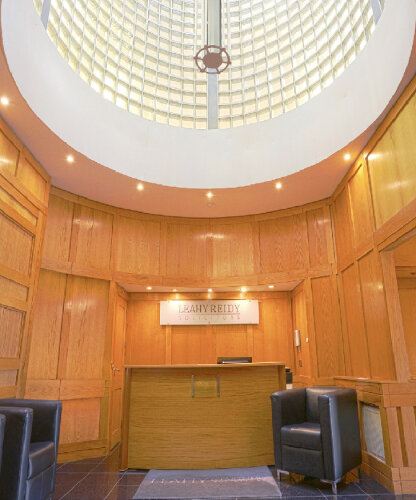Best Defamation Lawyers in Limerick
Share your needs with us, get contacted by law firms.
Free. Takes 2 min.
List of the best lawyers in Limerick, Ireland
About Defamation Law in Limerick, Ireland
Defamation law in Limerick, Ireland is governed by both common law principles and dedicated legislation, primarily the Defamation Act 2009. Defamation covers statements—whether written (libel) or spoken (slander)—that are likely to harm a person’s reputation in the minds of reasonable members of society. If you believe you have been defamed, or if you are accused of defaming someone, understanding your rights and obligations under Irish law is crucial. Defamation cases can arise in personal settings, the workplace, traditional media, and online platforms, making it vital for residents of Limerick to be informed about the legal framework and remedies available.
Why You May Need a Lawyer
Defamation cases are often complex and can impact your reputation, career, and personal relationships. You may require legal advice in situations such as:
- Being the subject of false and damaging statements in newspapers, social media, or public gatherings
- Being accused of making defamatory remarks and facing legal action
- Receiving a warning or demand letter relating to alleged defamation
- Unsure if a comment or publication about you qualifies as defamation
- Needing to remove or correct false statements online or in print
- Seeking compensation for reputational or financial harm suffered
- Wanting to protect your business or professional reputation following defamatory allegations
A lawyer with local experience can help assess the merits of your case, advise on the best course of action, and represent your interests, ensuring your rights are protected throughout the process.
Local Laws Overview
Defamation in Limerick, as in the rest of Ireland, is mainly regulated by the Defamation Act 2009. Key aspects include:
- Definition of Defamation: A statement is defamatory if it tends to injure a person’s reputation in the eyes of reasonable people.
- Publication Requirement: The defamatory statement must be communicated to at least one person other than the subject.
- Libel vs. Slander: Libel refers to written or published defamation; slander refers to spoken defamation.
- Defences: Common defences include the truth of the statement, honest opinion, absolute privilege (such as statements made in court), and fair and reasonable publication on a matter of public interest.
- Remedies: Victims may seek damages, a declaration of falsity, correction orders, or an injunction to prevent further publication.
- Time Limits: Legal actions for defamation must be taken within one year from the date of publication, which can be extended to two years in exceptional circumstances.
- Public Concerns: Special provisions exist regarding public figures and matters of public debate, balancing the right to freedom of expression and the right to a good name.
Frequently Asked Questions
What constitutes defamation under Irish law?
Defamation occurs when a statement that is likely to harm a person’s reputation is made to a third party, either in writing or verbally, and no valid defence applies.
Can I sue for something said about me online?
Yes, online statements, including posts on social media, forums, and review sites, can be considered defamatory if they meet the legal requirements.
What defences are available to someone accused of defamation?
Common defences include proving the truth of the statement, that it was an honest opinion, or that it was made under privilege, such as in legal proceedings.
Do I need a lawyer to make or defend a defamation claim?
While it is possible to represent yourself, defamation law is complex. It is advisable to seek experienced legal representation to navigate the process effectively.
How long do I have to bring a defamation claim?
You must bring a defamation action within one year of the publication of the statement, although the court may extend this up to two years in exceptional cases.
What compensation can I receive if I win a defamation case?
Successful claimants may receive monetary damages for loss of reputation, distress, and any financial losses suffered, as well as a public statement correcting the record.
Is it considered defamation if the statement was only made to one person?
No. For a statement to be defamatory, it must be communicated to at least one person other than the person it concerns.
Are public figures treated differently under defamation law?
While the same legal principles apply, courts consider the public interest in the open discussion of public figures, which can be a relevant factor in some defences.
Can apologies or retractions resolve a defamation dispute?
Offering an apology or issuing a retraction can sometimes prevent legal action or reduce damages, but it does not automatically end a claim unless accepted by the claimant.
What should I do if I receive a warning letter or a solicitor’s letter regarding defamation?
Do not ignore the letter. Take it seriously and seek legal advice before responding to protect your rights and avoid making the situation worse.
Additional Resources
If you need further help or information, consider the following resources:
- Civil Legal Aid Board – provides legal advice and assistance for those who qualify
- Citizens Information – offers accessible information on legal rights and procedures
- Law Society of Ireland – can help locate qualified local solicitors in Limerick
- Press Ombudsman and Press Council – for complaints about media publications
- Data Protection Commission – for issues where defamation overlaps with data privacy
Next Steps
If you believe you are a victim of defamation, or you have been accused of defamation in Limerick, Ireland, here are key steps to take:
- Document the statement, including when, where, and how it was made or published
- Preserve any evidence, such as screenshots, messages, or recordings
- Avoid responding publicly or engaging with the other party until you have received legal advice
- Consult a local solicitor experienced in defamation cases to discuss your options
- If eligible, apply for legal aid or seek guidance from Citizens Information
- Follow your solicitor’s advice regarding possible remedies, negotiations, or court proceedings
Proactively seeking professional advice can help protect your reputation, resolve disputes, and ensure your rights are respected within the Irish legal system.
Lawzana helps you find the best lawyers and law firms in Limerick through a curated and pre-screened list of qualified legal professionals. Our platform offers rankings and detailed profiles of attorneys and law firms, allowing you to compare based on practice areas, including Defamation, experience, and client feedback.
Each profile includes a description of the firm's areas of practice, client reviews, team members and partners, year of establishment, spoken languages, office locations, contact information, social media presence, and any published articles or resources. Most firms on our platform speak English and are experienced in both local and international legal matters.
Get a quote from top-rated law firms in Limerick, Ireland — quickly, securely, and without unnecessary hassle.
Disclaimer:
The information provided on this page is for general informational purposes only and does not constitute legal advice. While we strive to ensure the accuracy and relevance of the content, legal information may change over time, and interpretations of the law can vary. You should always consult with a qualified legal professional for advice specific to your situation.
We disclaim all liability for actions taken or not taken based on the content of this page. If you believe any information is incorrect or outdated, please contact us, and we will review and update it where appropriate.












